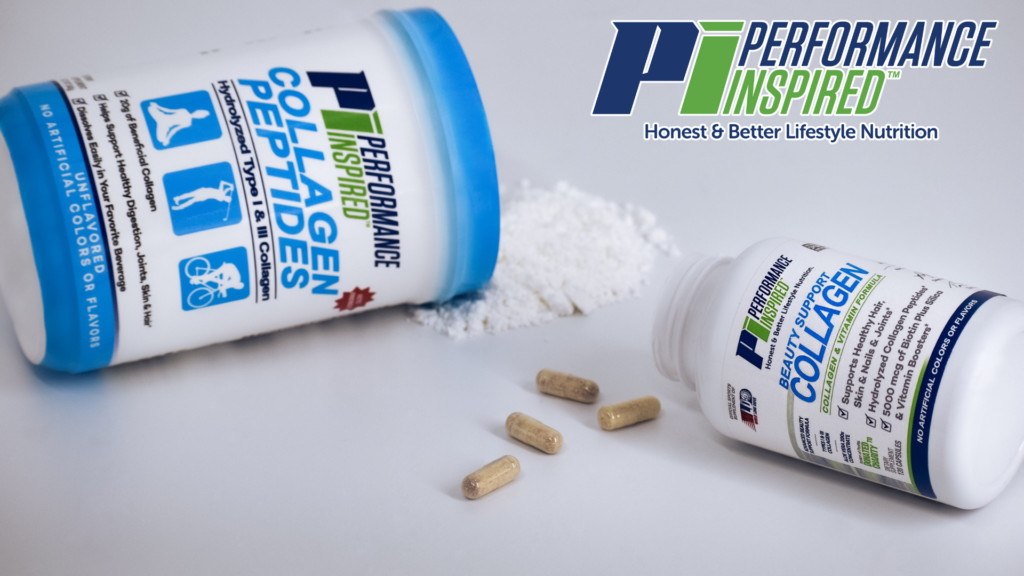What Is Collagen, and How Can It Help Me?

Have you noticed that your skin is becoming wrinkled or crepey? What about a hallowing around your eyes? Do your muscles ache? Are your tendons and ligaments less flexible than they used to be? Do you suffer from sore or stiff joints or problems with blood flow? If so, you may be suffering from a decrease in collagen.
According to the Cleveland Clinic, “Collagen is the most abundant protein in your body. It accounts for about 30% of your body’s total protein. Collagen is the primary building block of your body’s skin, muscles, bones, tendons and ligaments, and other connective tissues. It’s also found in your organs, blood vessels and intestinal lining.”
In other words, it affects a significant portion of our bodies!
Collagen provides support and structure to our skin, our bones, our muscles, and even our connective tissues.
While twenty-eight types of collagen types have been identified, there are five main types:
- Type I makes up 90% of our body’s collagen. It provides structure to our bones, skin, ligaments and tendons.
- Type II is found in elastic cartilage, which helps support our joints.
- Type III is in our muscles, organs, and arteries.
- Type IV is in our skin.
- Type V is mostly found in our corneas.
Our bodies produce collagen, and we get it from some of the foods we consume. WebMD explains that our bodies make it naturally by “combining amino acids, the building blocks of proteins found in food.” Thus, our bodies need proline, glycine, vitamin C, zinc, and copper.
These vitamins and minerals are found in the foods we eat. That’s why it’s important to eat a wide variety of healthy and fresh foods, including egg whites, dairy, chicken and pork skins, citrus fruits, beef, shellfish, pork, beans, nuts, cashews, and more.
But as we get older, our bodies produce less collagen and it begins to break down faster. This is especially true for women after menopause and both men and women after age sixty.
There are many things we can do to decrease the loss of collagen in our bodies. Sunlight damages collagen, so wearing sunscreen (at least 30 SPF) when we go outside is crucial. In addition to all of the other ways smoking damages our bodies, it also damages collagen. So if you smoke, there is no better time to quit. Finally, sugar and refined carbs also damage and weaken collagen. So cut out those white breads and limit those sweet snacks.
Because everyone needs collagen and everyone eventually loses it, collagen supplements have become extremely popular recently. Benefits include stronger bones, better skin elasticity and hydration, thicker hair, healthier nails, reduced osteoarthritis pain, and possibly even increased muscle mass and improved heart health.
WebMD explains that there have not been enough studies done on humans about collagen supplements, but it does say that while “there’s reasonable evidence that they help maintain hydrated skin and relieve osteoarthritis pain, we need more studies into less well-understood benefits, such as lowering blood pressure and blood sugar levels.”
That great news! And that is why Performance Inspired has created two easy ways to take collagen—gummies and a powder form to mix with a drink.
Our Collagen Powder is hydrolyzed with Types I and III collagen. This supports healthy joints, hair, skin, nails, and digestion. This powder is unflavored so you can mix it with your favorite beverage.
Our Collagen Plus Biotin Gummies also support healthy joints, hair, skin, nails, and digestion. But we also added biotin for an added layer of protection. These gummies taste great and can be easily taken anywhere.
How much can we consume, and how often?
WebMD explains that “adults can safely consume between 2.5 and 15 grams of collagen a day.” It also explains that “because collagen is basically protein, you can’t overdose on it.” But it warns that excessive protein may eventually harm your kidneys. So, of course, before you start any supplement, talk with your doctor, especially if you are taking any prescription meds or other supplements.
We all need collagen, and it’s important to eat well and care for our bodies by limiting exposure to sunlight and not smoking. But the natural aging process means that we are all losing collagen. So if you are experiencing any of the symptoms of low collagen, check your diet and try our gummies or powder. Then let us know when you’ve noticed a change!



